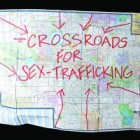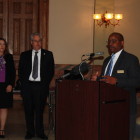
A bill that toughens laws against sex trafficking was voted out of a Georgia State Senate committee this morning, despite calls by conservative activist to add an amendment. HB 200 now moves to the Senate Rules Committee before heading on to the Senate floor for a vote. Sue Ella Deadwyler, the author of the Georgia Insight newsletter, who claims to have been “called by God,” wanted to change language that provides an affirmative defense for victims of sex trafficking under the age of 18. Proponents of the measure say the language concerning affirmative defense defines minors as victims of the sex trafficking industry, rather than criminals that participate in it. But Deadwyler disagreed, arguing that the bill legalizes child prostitution. She wants to reduce the age that children are prosecuted from 18 to 13, otherwise Georgia will become “a haven for male and female participants in various sexually explicit professions, including prostitution, masturbation for hire and pornography,” according to her website, GeorgiaInsight.org. At a press conference in February, 2010, Deadwyler said, “Sure there are those who are forced into prostitution, but I think most of them volunteer .









